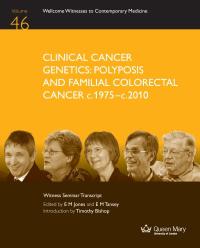Clinical Cancer Genetics: Polyposis and Familial Colorectal Cancer c.1975-c.2010
 Colorectal, or bowel, cancers are the third most commonly-diagnosed type of cancers. Chaired by Professor Peter Harper, this Witness Seminar examines breakthroughs in medical research that have determined the genetic basis of many such cancers.
Colorectal, or bowel, cancers are the third most commonly-diagnosed type of cancers. Chaired by Professor Peter Harper, this Witness Seminar examines breakthroughs in medical research that have determined the genetic basis of many such cancers.
The introduction explains, in particular, the role of the UK’s Cancer Family Study Group, founded in 1984, whilst during the seminar several participants recall that period as one of scepticism among cancer experts about the relevance of genetics. Various contributors acknowledge their predecessors in the field, especially staff at St Mark’s Hospital who pioneered research into familial adenomatous polyposis. This condition, in which multiple benign polyps appear in the bowel, was first suspected to be pre-cancerous by St Mark’s doctors and led to the foundation of the hospital’s Polyposis Register of patients in 1924. These early pathological records enabled, and stimulated, the international research community to undertake family linkages and genetic studies, thus contributing to the eventual identification of a polyposis gene in 1991.
Equally prominent in the discussion is hereditary non-polyposis colorectal cancer, as are questions of research funding and collaborations, and the development of specific diagnostic tests and therapeutic approaches.
Jones E M and Tansey E M. (eds) (2013)
Wellcome Witnesses to Contemporary Medicine, vol. 46. London: Queen Mary, University of London.
ISBN 978 0 90223 885 5
Colour images of Dr Bussey's original polyposis register cards (see volume Appendix 2, pp.88). Click images to see larger, or you can download them (115317 and 115319).






